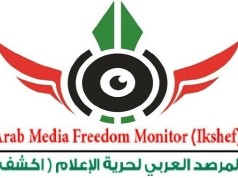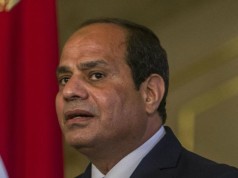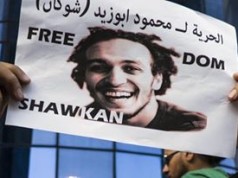- 3 unprecedented major violations: storming EJS headquarters, detaining EJS head and referring cases of four journalists to the Mufti
- A new bill on media would take away constitutional gains
- Number of jailed journalists hits 92
- 29 physical abuses, 19 coverage denials, 4 travel bans and 3 gag orders
- Banning articles of 4 prominent writers
- Al-Sisi orders no to film slums
LONDON, June 1, 2016
Although May includes the World Press Freedom Day (3 May each year), it was one of the most hard months Egyptian press went through this year, not only because of the high number of violations compared to all previous months, but for the occurrence of major violations taking place for the first time in the history of the Egyptian press.
The month began with storming the headquarters of Egyptian Journalists’ Syndicate “EJS” for the first time in its history by security force consisted of about 40 policemen to arrest two journalists who took refuge in it after the issuance of an order by the prosecutor’s office to arrest them for charges of demonstrating and spreading of false news. The two journalists are Amr Badr and Mahmoud Al-Sakka who went to EJS seeking protection until they is provided guarantees for the integrity of the investigation with them.
May ended with summoning EJS head, Yahya Qalash, his deputy, Khaled Al-Balshy, and EJS secretary general, Jamal Abdul-Rahim, to interrogate them concerning a report EJS already filed against the Ministry of Interiors because of storming its quarters, but the three were surprised by finding that they were turned into defendants and were interrogated for 16 hours. The prosecution decided to release them on bail of 10 thousand pounds (about a thousand dollars) for each of them. When they refused to pay bail as an illegal procedure, they have been held in Qasr Al-Nil police station for a whole night, and then they were referred to an urgent trial on June 4, 2016, a measure taking place for the first time in EJS history, too.
This seems to be a punishment against the Egyptian journalists’ community that challenged the ruling authorities because of storming EJS headquarters, as thousands of journalists rushed to an emergency general meeting on May 4, a day after a protest was organized by journalists against the raid took place on the occasion of World Press Freedom Day in front of EJS headquarters.
The general meeting has issued a number of unusual decisions and recommendations, which represented a high level of challenging the authorities, ranging from demanding a formal apology from President Abdel-Fattah Al-Sisi for storming EJS headquarters, resignation of the interior minister and the need to release all prisoners of conscience and expression.
Although EJS expressed flexibility later concerning some of the demands, such as implicitly withdrawal of the request for an apology by Al-Sisi, it has been insisting on firing the interior minister. The ruling authorities responded with officially indicting EJS head and two colleagues of harboring wanted people, and detaining the three of them in a police station for a whole night.
The authorities also intervened to divide journalists by pushing loyalists to form a so-called Course Correction Front that supported the authorities’ stance, and even demanded the resignation of the EJS head and members of the current board, and called for a new EJS elections. However, this front has been limited to a few figures known to be fully loyal to authorities, and not concerned with the demands of press freedoms.
The authorities announced during May a new media bill that enshrines state control over the media and take away many of the constitutional gains for press freedoms. Meanwhile, sell-offs and mergers of some of the major TV channels took place, which some observers interpreted as the result of pressure on the freedom of the press and on businessmen owning those TV channels.
During May, Egyptian authorities continued imprisonment of journalists, as they arrested earlier this month journalists Amr Badr, editor-in-chief of Yanair portal and his colleague Mahmoud Al-Sakka. Also, the wife of journalist Sami Al-Madani revealed that her husband was detained since April because of confronting land properties mafia, bringing the number of journalists imprisoned yet to 92 journalists. This keeps Egypt in the first place globally as journalists’ jailer. Violations against jailed journalists continued, as Ikshef team was able to document seven new cases of violations during the month, mostly focused on the prevention of the visits and abuse concerning provision of necessary medical care, causing health complications for some of the jailed journalists.
In terms of new police reports, trials and judicial rulings, Ikshef was able to document 40 cases (We should point out that these cases are what Ikshef team was able to document, and certainly there are other cases we could not document). The most notable cases are referring EJS head and two members of its board to a quick trial on charges of harboring suspects at the EJS headquarters, and the referral of cases of four journalists working or cooperating with Al-Jazeera news network for the Mufti to know his legal opinion on executing them, which is an unprecedented move concerning a group of journalist (there was only the case journalist and writer Walid Shalabi, who is jailed in Rabia Operations Room trial, whose sentence was overturned by the Court of Cassation which ordered retrial )
The month of May witnessed 29 physical abuses against journalists, reporters and field photographers of which 25 cases occurred against (individual) persons and 4 cases against groups of journalists. The majority of the abuses was carried out by security forces.
There were also 19 cases of coverage bans all of which were collective bans against reporters.
Moreover, there were 4 cases of banning from writing included writer and human rights figure Nawal Al-Saadawim, Suleiman Al-Hakim, Abdul Khaliq Farooq and Ammar Ali Hassan, all of whom are leftist figures.
Also, Ikshef was able to document 4 cases of travel bans or entry bans during the month, which included a travel ban of TV host Tawfiq Okasha, and banning entry of a French journalist. Additionally, artists-turned-TV anchors Hisham Abdullah and Mohammad Shoman were put on watch lists.
May has witnessed two gag orders, one was by a court and the second by the Attorney General.
During the month, a new directive issued by Al-Sisi to prevent filming slums, because of allegations it carry negative unreal images.




